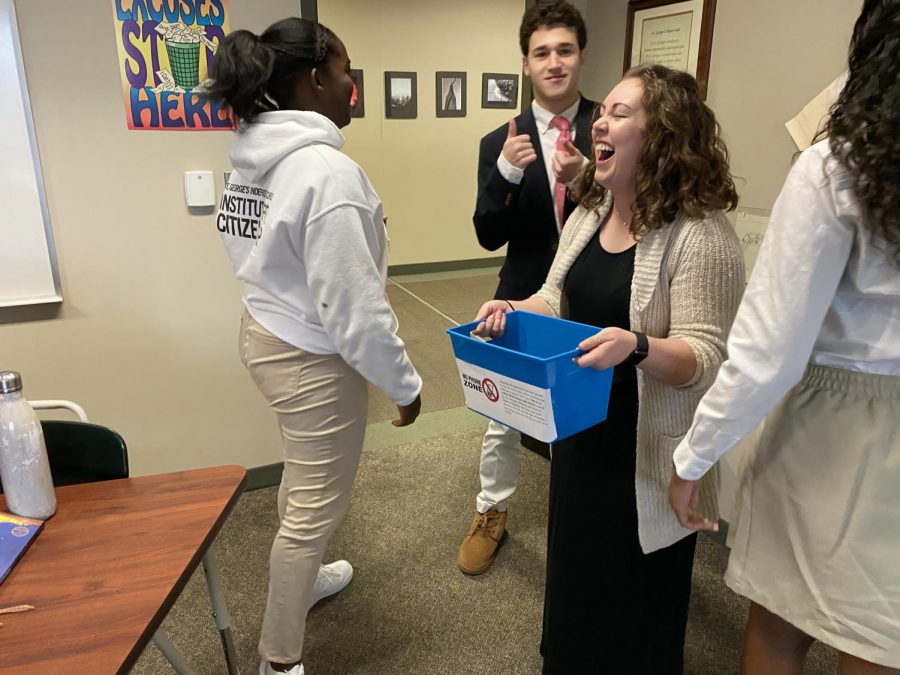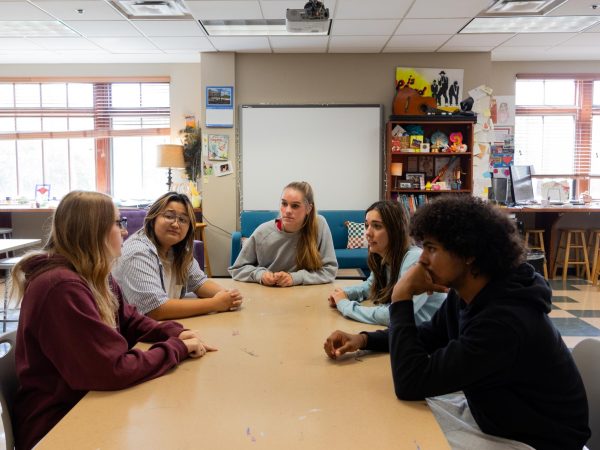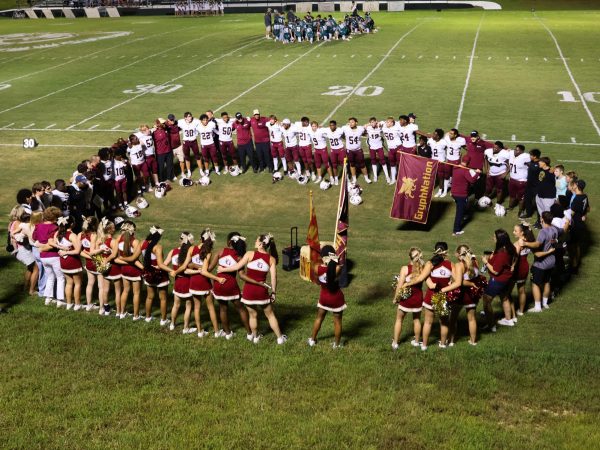Crackdown
New phone policy draws student criticism
Photo: Snowden Farnsworth
Upper school history teacher Emily Metz laughs as she takes up phones at the beginning of her first period AP Government class. The students are required to put their phones into the blue bin at the start of each class period.
On Friday, Feb. 7, bright blue bins crept into class-rooms. Their purpose? To seize the students’ cell phones one by one.
Right after school had dismissed for the weekend, students received an email from Dean of Students Kalyn Underwood issuing a new phone policy. Students are now required to place their phone in the blue bins at the beginning of each class period.
“The expectation is that all phones are to be put in the box. Failure to do so will result in your phone being collected for the day,” Ms. Underwood wrote. “Continuing to do so will cause it to be given to me and kept for longer.”
What’s the cause for the change? The email stated that teachers had grown worried about the amount of time students spend glued to their phones and the anxiety that overuse creates. They were also increasingly frustrated by the constant distractions caused by phone use.
In an interview with the Lodge, Ms. Underwood cited her own experiences in the classroom.
“I mean, the number of times where I would be in class and somebody would take their phone and just do a random snap of themselves, where [the picture] half of their face and the rest is the ceiling, just so that they could post something. That’s weird,” she said. “There’s no need to do that, you know? there’s no reason to say, ‘Yep, I’m in class.’” While some teachers might have been on board with the change, students were another story.
Because the email was sent in the afternoon on a Friday, many students spent the weekend sim-mering.
“Of course, there was an uproar in my grade, everybody was texting with each other about it,” prefect Silas Rhodes said.
Fellow prefect Maggie Emmendorfer said her initial reaction was strong.
“I was, initially, very truly, real-ly angry and upset about it,” she said. “I felt really stupid about it because, obviously, we aren’t gonna want our phones taken away. I just felt dumb because I’m like, I know that they know this is how I’m going to react. But the main thing that made me really upset is the lack of trust there.”
Rhodes cited the same concern.“We agree with the idea behind it, the concept that students shouldn’t be on their phone in class, but the methods of putting them in a box frankly seems childish and not really up to the genuine standards of St. George’s with the trust we’ve been given in the past,” Rhodes said. “One of my favorite parts about St. George’s is the trust and respect between students and faculty, but [it] isn’t evident in this policy.”
Ms. Underwood has heard the students’ concerns but says it won’t change what happens.
“I heard from some students saying they were really upset that we didn’t have a conversation about it first or that there wasn’t some warning given,” Ms. Underwood said, “which I think is a nice idea.”
However, Ms. Underwood believed that a warning would have just been brushed off.
“The warnings don’t work,” she said. “There’s already been warn-ings. The warnings have been the referrals that people get, and it’s just not a battle that’s worth continuing.
”Upper School Guidance Counselor Elizabeth Bran said that the new policy shouldn’t be a huge change for the students that had been using their phones responsibly to begin with.
“If you weren’t someone that was on your phone when you weren’t supposed to be, it’s not a big deal to put it in the bucket,” Ms. Bran said. “And if it is a big deal that you have to put it in the bucket, then that’s an indication that you weren’t handling it well under the old policy.”
Director of Theatre Karen Dean said that she has had ample experience with students not managing their cell phone use well in study halls, even when they are struggling academically and could really use the time to work.
“When they come in, they get on their phone and listen to music and don’t do a bloomin’ thing,” she said.
Students were shocked by the change, but phone policy is far from a new issue to the St. George’s community.
According to Ms. Underwood, four or five years ago phones weren’t allowed to be seen at all. When that policy was revised, students were still required to use them responsibly and sparingly, with the expectation that they were never to be used in the hallway.
However, Ms. Underwood wrote in her email that she saw that cell phones were often being used in the hallways, which she found concerning.“
As I walk through the halls, I see more phones out and an impressive amount of social media use taking place,” Ms. Underwood wrote. “This has been shown to increase instances of anxiety in students and certainly distract[s] them from learning.”
While some studies do draw this link, many are wary of linking the two directly.
A 2018 study published in the International Journal of Environmental Research and Public Health found that variables such as monthly economic budgets can trigger anxiety symptoms, clouding the results of tests.
The study states that “the correlation between anxiety and mobile phone use from our study is still an important question for future prospective studies.”
Nevertheless, the blue bins came into existence.
Some students were angry that they had to use the bins and had concerns over the safety of their phones.
“People just toss their phones in,” Emmendorfer said. “A bunch of people have their screens cracked because people just throw things.”
Freshman Angelina David is one of the students that had her phone damaged in one of the bins when another student dropped their phone in.
“Ever since this phone bin thing [started], my phone screen has been completely cracked,” David said. “There’s a ginormous crack down the middle. It looks really bad, and it’s annoying.”
Other students, like sophomore Ellie Christie, were bothered by the email’s reference to anxiety.
“I am going to be honest, I wouldn’t be as annoyed by the policy if it wasn’t for the fact that they mentioned anxiety in both the email and on the little notes on the little boxes,” Christie said. “Because I feel like if you’re going to act like you care about the mental health aspect of this, then maybe actually ask the students how this affects their mental health instead of just assuming, based on some studies, that everyone’s more anxious because they have phones in their pockets, you know? Like, it just sort of seems like, ‘Hey, this is a thing that exists and we want to look like we care.’”
Senior Samantha Garrett ex-pressed similar frustrations.
“As somebody with a lot of anxiety, I keep my phone on me so I can text my therapist and text my mom if I’m freaking out,” Garrett said. “But if my phone is up at the front of the classroom, if I walk up to the box, everybody’s gonna look. And that’s not the feeling that [I] want if I’m on the verge of a panic attack.”
The administration has explained that students can keep their phones next to the bin rather than inside of it and can access them if it’s an emergency, and Ms. Bran hopes to ease their concerns a little.
“I think teachers are still very comfortable saying, ‘Oh, it’s fine for you to have your phone today,’” Ms. Bran said. “There’s still plenty of teacher discretion about when students can have it. But I think it’s a reminder that when you’re in class you need to be singularly focused.
While Ms. Bran was optimistic about students being more focused, Christie thinks that’s not entirely realistic.“Kids will find any way to not pay attention if they don’t want to,” she said.












